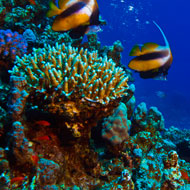
Stops fish from learning to avoid predators
The bleaching and death of coral reefs directly affects how reef-dwelling fish are able to detect and avoid predators, a scientific study has revealed.
Published in Proceedings of the Royal Society B, the study shows that smell of the dying coral affects the ability of fish to sense the presence and intensity of a threat.
In the study, the scientists split damselfish into two groups. One group lived an enclosed healthy coral reef environment, while the other group lived amongst the skeletons of dead coral.
The fish were then trained to recognise the scent of a new predator, which was twinned with another chemical that damselfish release when they’re under attack.
On the healthy reefs the fish learned the new predators smell and hid amongst the coral. On the dead reefs the fish continued to explore, leaving themselves open to attack.
The researchers say that understanding how some species cope with or acclimatise to the detrimental impacts of habitat degradation ‘will be crucial to defining the scope of resilience in threatened communities’.



 The veterinary mental health charity Vetlife is inviting the veterinary community to join it for a sponsored cold-water dip.
The veterinary mental health charity Vetlife is inviting the veterinary community to join it for a sponsored cold-water dip.